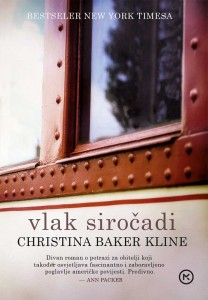
Dissemination
Orphan Train - Methodology
Written by Super UserTitle of Activity
Orphan Train
Description of educational activity
Duration: 2 x 45 minutes
Student Age: 16 – 17
Student Class organization: group work, individual work, frontal work
Lesson goal:
- development to work on the text: kind of narrator and his influence on the reception of the work, the characterization of the characters and the characterization procedures
- recognition of the impact of socio-historical circumstances on the life of the child
- empathy development and critical thinking
Support materials:
-Internet
-Teaching leaflets
Highlights:
- 1 part of the story
Activities:
Reading, interpreting and discussing the text, watching and discussing video clips
I. Activities before reading
- Provide motivation, open students to share their own experiences, group cohesion
The students are divided into groups of four. Each group gets the assignment of defining the concept of home and the concept of family.
Using the dramatic technique of dynamic statues to present their vision of this concept: to show it by movement, by sound, by communion with others. Presentation of the results of the work.
Together watch a clip from the documentary film about the becoming of the Orphan train novel.
Group task: Write the three key information’s you think are most important and that impressed you the most. Together comment.
II. Activities during reading.
Students first work independently. They get part no. 1 and a teaching leaflet for focused reading (recognition of the narrator, narrator characterization: distinguishing features from an emotional state, differentiation of objective and subjective time).
III. Common activities after reading.
By linking the clips from the documentary movie and reading the text, the students are preparing to participate in a discussion: they need to choose a side. The teacher makes a statement, and the students choose whether they agree with it or disagree by taking the foreseen places in the classroom. There is also the possibility of "I'm not sure."
Students argue their opinions. Students who are not sure after the argumentation can choose their own opinion. The goal of the game is to open a discussion and updating of the issues (claims can be made from the text itself but also the issues it opens).
An example of a claim:
- Orphan's train is a positive attempt to help abandoned, unbridled children.
- People who adopt children have the right to change their name, for their good.
- The care of a nine-year-old over a two-year-old is an overwhelming task.
- Escape from your own country in search of a better life is not a good solution for families. (...)
Evaluation and Assessment Method:
- Teacher Role - Prepare Materials and act as a Moderator
- Evaluation of group work - questionnaire: evaluation and self-evaluation
Students are assessed on the basis of their abilities:
- reading comprehension, recognition of the narrator's type, characterization of the main heroine
- participation in the discussions by expressing their points of view
The Impact of Activity on Reading RSP:
Activities encourage the development of critical thinking, as well as the empathy of the students because of the heartbreaking story. At the same time, they are interested in expanding their own knowledge of the problems encountered in the text and the video clips: the care of orphans, abandoned children, emigration from their homeland.
Connection to curriculum
Class: Freshman or Junior year
Curriculum:
Epics - access to epic work (Freshman year)
Realism - Social Issues (Junior year)
Knowledge:
- the impact of socio-historical opportunities on an individual’s life - recognition of social issues
- the elements of epic technique: the narrator, the characterization of the character, the recognition of characterization procedures
- Critical thinking about the world, family, society, migration
- enjoying reading literary literature
Skills:
- collection, selection and evaluation of information
- reading, interpreting and evaluating literary texts
Competence:
- communication competences
Bibliographic reference to be used during the activity
Christina Baker Kline: Orphan Train
Mozaik knjiga, Zagreb, 2016.
298 pg., Soft cover
ISBN 9789531418447


Short description of digital sources
Testimonials and real clips from the orphan trains from documentaries were used in making of the book.
https://www.youtube.com/watch?v=WDJx8m5DCL4
https://www.youtube.com/watch?v=9Z3djWoTGFU
https://www.youtube.com/watch?v=9Z3djWoTGFU
Results
Expected outcomes:
Students will be able to:
- characterize the character based on the text
- explain the impact of socio-historical opportunities of the child’s destiny
- by argumentation they are able to state their opinions and take into consideration opinions of others
Recommendations
Speaking of the tough destiny of abandoned children and orphans in the early 20th century in America, this work allows the development of empathy of the students, while at the same time stimulating them to note the social problems that are still present today as well as their critical observation. The work is shocking, but at the same time positive and optimistic.
Contact
X gimnazija ''Ivan Supek''
Ul. Vjekoslava Klaića 7
10000
Zagreb
E-mail: partners@handbook4rspreaders.org











